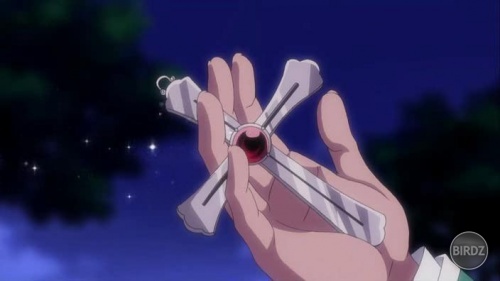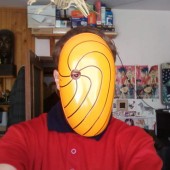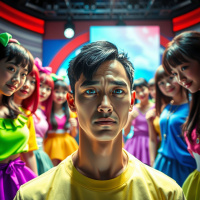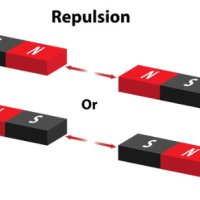

f_266964693_364dc2c1c18bf52d902b51158315ff5e
4 komenty
1
 orochimaru
16. 12.decembra 2009 22:49
orochimaru
16. 12.decembra 2009 22:49
Tento kriz nema chybu you..husteee to je chech!!!...
2
..vdaka tomuto krizu - ruzeninu sa moze Moka-san pomocou jedneho kamarata chlapca premenit na praveho upira ked jej da dole ten privesok, ten kriz tak sa premeni z maleho ruzovlaseho dievcatka na silneho bielo-sedovlaseho upira chech!!!...
3

Rosario + Vampire
GN 9
Synopsis:
Tsukune Aono leads the life of an ordinary teenage boy ... except for the part where he"s attending a boarding school for monsters. Things are looking particularly bad for Tsukune after finding out that Hokuto, the student council president, is actually a villain bent on destroying the school. Hokuto"s already pushed the authorities out of the way and beaten Tsukune to within an inch of his life, so the only hope left is the vampire Moka—but can she do anything to stop Hokuto now that his plan is all but complete? If they should survive this ordeal, a lively school festival awaits, but things get a little too lively when the parents of Tsukune"s would-be girlfriends start showing up. Worse yet, Tsukune"s cousin comes to visit and learn more about his school. Will the secrets of the monster world be revealed at last?
Review:
It may have lasted for just a moment, but somewhere amidst Tsukune and Hokuto"s fisticuffs and the chaos of dark magic gone haywire, there was finally a sense of peril in Rosario+Vampire. A moment of drama where it looked like all hope was lost and that our hero might have to make a noble sacrifice.
And then it turned right back into a predictable horror-themed action series where everyone becomes friends and magic saves the day.
Thus ends the longest and most ambitious arc yet in Rosario+Vampire, the one that spans a full volume and a half, where Akihisa Ikeda could have taken a chance and steered the story in a dramatic new direction. He almost got there, revealing a shocking truth about Hokuto that could have been a game-changer for the series. But no, Ikeda turns chicken at the last moment, uses the ever-convenient Power of Friendship to smooth things over, and erases any possible plot or character developments that would have made things interesting. Heck, even the battle with the witch on the hill (see Volumes 4-5) gave us a new character. This one, by comparison, gives us nothing: Hokuto has an arbitrary, unconvincing change of heart, school life is reset to the way it was, and the villain walks off as if nothing happened. How"s that for an anticlimax?
After that level of disappointment, it"s kind of a relief to see the story return to mindless comedy shenanigans. Once again, Tsukune"s harem is fighting over who gets to spend time with him—these character conflicts are always good for a laugh—and this time they even bring their mothers into the fray. Ah, nothing complicates a love polygon quite like doting parents! Then comes Tsukune"s cousin, triggering the classic scenario where everyone has to hide a shocking secret from the one person who doesn"t know (which involves a whole lot of slapstick sorcery from Yukari the witch). But even such goofy, lighthearted moments ultimately fail to satisfy; after all, these gags and situations have been done many times before in much more accomplished ways. So basically, this volume fails to deliver on the dramatic, heavy-handed stuff, then it also fails to deliver on the silly comedic stuff. It"s a lose-lose situation for everyone.
The artwork, at least, isn"t quite as disappointing—the magic-laced action scenes are as convincing as ever (especially with Moka delivering her trademark flying kicks), and another lavishly designed monster shows up when Hokuto reveals his true form. In addition, the high page count per chapter allows plenty of room for well-planned layouts, achieving a good balance between detailed scenes and simpler, more straightforward imagery. But glance at any of these illustrations too long and the flaws become apparent: poses that land on just the wrong side of awkward, plastic-looking facial expressions, and backgrounds that either make use of photo-reference or just skimp out entirely. The visual polish and attractive characters may be enough to impress the untrained eye, but lying underneath it all is a very shaky foundation.
The dialogue, on the other hand, makes no pretenses about trying to look fancy and polished. This is a script that relies heavily on canned phrases, especially during Tsukune and Moka"s showdown with Hokuto: out of their mouths come the same old platitudes about the value of friendship and standing up for what"s right, while the villain sneers and snorts about his loneliness in this world and how the only thing that matters is power and dominion over others. By comparison, at least the canned phrases in the comedy chapters are entertaining—it"s always fun to see the girls sniping at each other, and Tsukune"s cousin turns out to be a veritable gold mine of one-liners with her rash personality and declamatory outbursts. The simplicity of the writing also lends itself to a highly readable translation; the sound effects, on the other hand, might be too readable as the big block letters that have taken place of the Japanese text often clash with the artwork.
So this is the dramatic finish to Tsukune"s battle against Hokuto, which turns out to be not that dramatic at all after the last couple of plot twists end up undoing all the damage. Then after that, the series jumps right back to the episodic harem antics that it should have outgrown in the first place, perhaps proving that it was never ready to make that big leap in plot development after all. Instead, Rosario+Vampire chooses to putter along as a bland concoction of horror elements, harem comedy, and occasional bursts of magical warfare that don"t really have any lasting effects. The story"s never going to go anywhere, the characters are never going to go anywhere, and the artwork is always going to have that same polished-but-flawed look. If this is the kind of stagnation and dullness that permeates the monster world, then we should all be thankful for being human.

Rosario + Vampire
GN 9
Synopsis:
Tsukune Aono leads the life of an ordinary teenage boy ... except for the part where he"s attending a boarding school for monsters. Things are looking particularly bad for Tsukune after finding out that Hokuto, the student council president, is actually a villain bent on destroying the school. Hokuto"s already pushed the authorities out of the way and beaten Tsukune to within an inch of his life, so the only hope left is the vampire Moka—but can she do anything to stop Hokuto now that his plan is all but complete? If they should survive this ordeal, a lively school festival awaits, but things get a little too lively when the parents of Tsukune"s would-be girlfriends start showing up. Worse yet, Tsukune"s cousin comes to visit and learn more about his school. Will the secrets of the monster world be revealed at last?
Review:
It may have lasted for just a moment, but somewhere amidst Tsukune and Hokuto"s fisticuffs and the chaos of dark magic gone haywire, there was finally a sense of peril in Rosario+Vampire. A moment of drama where it looked like all hope was lost and that our hero might have to make a noble sacrifice.
And then it turned right back into a predictable horror-themed action series where everyone becomes friends and magic saves the day.
Thus ends the longest and most ambitious arc yet in Rosario+Vampire, the one that spans a full volume and a half, where Akihisa Ikeda could have taken a chance and steered the story in a dramatic new direction. He almost got there, revealing a shocking truth about Hokuto that could have been a game-changer for the series. But no, Ikeda turns chicken at the last moment, uses the ever-convenient Power of Friendship to smooth things over, and erases any possible plot or character developments that would have made things interesting. Heck, even the battle with the witch on the hill (see Volumes 4-5) gave us a new character. This one, by comparison, gives us nothing: Hokuto has an arbitrary, unconvincing change of heart, school life is reset to the way it was, and the villain walks off as if nothing happened. How"s that for an anticlimax?
After that level of disappointment, it"s kind of a relief to see the story return to mindless comedy shenanigans. Once again, Tsukune"s harem is fighting over who gets to spend time with him—these character conflicts are always good for a laugh—and this time they even bring their mothers into the fray. Ah, nothing complicates a love polygon quite like doting parents! Then comes Tsukune"s cousin, triggering the classic scenario where everyone has to hide a shocking secret from the one person who doesn"t know (which involves a whole lot of slapstick sorcery from Yukari the witch). But even such goofy, lighthearted moments ultimately fail to satisfy; after all, these gags and situations have been done many times before in much more accomplished ways. So basically, this volume fails to deliver on the dramatic, heavy-handed stuff, then it also fails to deliver on the silly comedic stuff. It"s a lose-lose situation for everyone.
The artwork, at least, isn"t quite as disappointing—the magic-laced action scenes are as convincing as ever (especially with Moka delivering her trademark flying kicks), and another lavishly designed monster shows up when Hokuto reveals his true form. In addition, the high page count per chapter allows plenty of room for well-planned layouts, achieving a good balance between detailed scenes and simpler, more straightforward imagery. But glance at any of these illustrations too long and the flaws become apparent: poses that land on just the wrong side of awkward, plastic-looking facial expressions, and backgrounds that either make use of photo-reference or just skimp out entirely. The visual polish and attractive characters may be enough to impress the untrained eye, but lying underneath it all is a very shaky foundation.
The dialogue, on the other hand, makes no pretenses about trying to look fancy and polished. This is a script that relies heavily on canned phrases, especially during Tsukune and Moka"s showdown with Hokuto: out of their mouths come the same old platitudes about the value of friendship and standing up for what"s right, while the villain sneers and snorts about his loneliness in this world and how the only thing that matters is power and dominion over others. By comparison, at least the canned phrases in the comedy chapters are entertaining—it"s always fun to see the girls sniping at each other, and Tsukune"s cousin turns out to be a veritable gold mine of one-liners with her rash personality and declamatory outbursts. The simplicity of the writing also lends itself to a highly readable translation; the sound effects, on the other hand, might be too readable as the big block letters that have taken place of the Japanese text often clash with the artwork.
So this is the dramatic finish to Tsukune"s battle against Hokuto, which turns out to be not that dramatic at all after the last couple of plot twists end up undoing all the damage. Then after that, the series jumps right back to the episodic harem antics that it should have outgrown in the first place, perhaps proving that it was never ready to make that big leap in plot development after all. Instead, Rosario+Vampire chooses to putter along as a bland concoction of horror elements, harem comedy, and occasional bursts of magical warfare that don"t really have any lasting effects. The story"s never going to go anywhere, the characters are never going to go anywhere, and the artwork is always going to have that same polished-but-flawed look. If this is the kind of stagnation and dullness that permeates the monster world, then we should all be thankful for being human.

Napíš svoj komentár
-
 1 Uhadni birdzaka
1 Uhadni birdzaka -
 2 Vcera som sa po dlhej dobe...
2 Vcera som sa po dlhej dobe... -
 3 Fico tu bude vládnuť ďalších 20...
3 Fico tu bude vládnuť ďalších 20... -
 4 Najde osamely Teal konecne svoju raketacku?
4 Najde osamely Teal konecne svoju raketacku? -
 5 Nova Tesla Model SS
5 Nova Tesla Model SS -
 6 Možno sú oba to isté miesto
6 Možno sú oba to isté miesto - 7
 Obrázok od Y4nn4
Obrázok od Y4nn4 - 8
 Obrázok od Tomas5555555
Obrázok od Tomas5555555 - 9
 Obrázok od Tomas5555555
Obrázok od Tomas5555555 - 10
 Obrázok od Tomas5555555
Obrázok od Tomas5555555
-
 1 Caute
1 Caute -
 2 *my soul unlocked* ...
2 *my soul unlocked* ... -
 3 Inspirácia avat. obrázkom @Kosmiklove
3 Inspirácia avat. obrázkom @Kosmiklove -
 4 Som si normálne musela spraviť ScreenShot...
4 Som si normálne musela spraviť ScreenShot... -
 5 Tá Miley si tak dojebala ksicht...
5 Tá Miley si tak dojebala ksicht... -
 6 Chudákovi kerrovi spolužiaci všetko pokazili
6 Chudákovi kerrovi spolužiaci všetko pokazili -
 7 Μόνος μου...
7 Μόνος μου... -
 8 Východný blok nakazený Ruskou propagandou. ...
8 Východný blok nakazený Ruskou propagandou. ... -
 9 Po mnohych rokoch ma opat zacalo...
9 Po mnohych rokoch ma opat zacalo... - 10
 Obrázok od Manutdman
Obrázok od Manutdman
 1 Na mňa si dnes psychiater spomenul...
1 Na mňa si dnes psychiater spomenul... 2 Ako budúci fejk účet navrhujem nickname...
2 Ako budúci fejk účet navrhujem nickname... 3 ❤️
3 ❤️